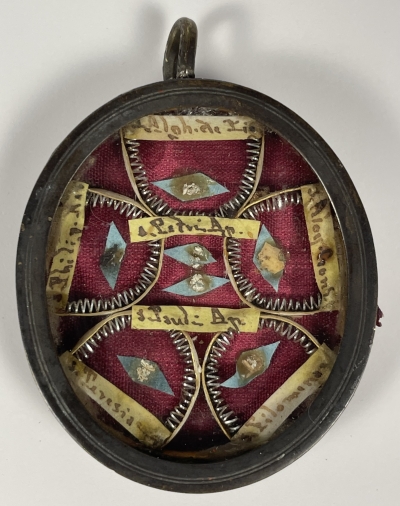Saint Peter († between AD 64 and 68), was one of the Twelve Apostles of Jesus Christ, leaders of the early Christian Church. He is also venerated as the "Apostle of the Apostles" and the first pope of the Roman Catholic Church, ordained by Jesus in the "Rock of My Church" dialogue in Matthew 16:18. Christian churches all venerate Peter as a major saint and associate him with founding the Church of Antioch and later the Church in Rome.
Saint Paul († AD 67), was an Apostle who taught the gospel of Christ to the first-century world and is generally considered one of the most important figures of the Apostolic Age founding several churches in Asia Minor and Europe. The Roman Martyrology assigns 29 June as the feast day of both Apostles, Peter and Paul.
Saint Alphonsus Maria de' Liguori, C.Ss.R. († 1787), was an Italian Catholic bishop, spiritual writer, and theologian who founded the Congregation of the Most Holy Redeemer (the Redemptorists). In 1762 he was appointed Bishop of Sant'Agata dei Goti. A prolific writer, he published nine editions of his Moral Theology in his lifetime, in addition to other devotional and ascetic works and letters. Among his best known works are The Glories of Mary and The Way of the Cross, the latter still used in parishes during Lenten devotions. He was canonized in 1839 by Pope Gregory XVI. Pope Pius IX proclaimed him a Doctor of the Church in 1871. One of the most widely read Catholic authors, Alphonsus Liguori is the patron saint of confessors.
Saint Philip the Apostle was one of the Twelve Apostles of Jesus who preached in Greece, Syria, and Phrygia. In the Roman Catholic Church, the feast day of Philip was traditionally observed on 1 May, the anniversary of the dedication of the church dedicated to them in Rome (now called the Church of the Twelve Apostles). The Eastern Orthodox Church celebrates Philip's feast day on 14 November. He is a patron of Cape Verde; Hatters; Pastry chefs; San Felipe Pueblo; and Uruguay.
Saint Aloysius Gonzaga, S.J. (Italian: Luigi Gonzaga; † 1591) was an Italian aristocrat who became a member of the Society of Jesus. While still a student at the Roman College, he died as a result of caring for the victims of an epidemic. He was beatified in 1605, and canonized in 1726. He is a patron of students, Christian youth, Jesuit scholastics, the blind, AIDS patients, AIDS caregivers.
Saint Teresa of Ávila, also called Saint Teresa of Jesus († 1582), was a prominent Spanish mystic, Carmelite nun, author during the Counter Reformation, and theologian of contemplative life through mental prayer. She was a reformer of the Carmelite Order and is considered to be, along with John of the Cross, a founder of the Discalced Carmelites. She was canonized in 1622 by Pope Gregory XV, and in 1970 was named a Doctor of the Church by Pope Paul VI. She is a Holy Patron of bodily ills; headaches; chess; loss of parents; people in need of grace; people in religious orders; people ridiculed for their piety; sick people; and sickness.
Saint Philomena was a young consecrated virgin whose remains were discovered on May 24/25 1802 in the Catacomb of Priscilla. The remains were translated to Mugnano del Cardinale in 1805 becoming the focus of widespread devotion; several miracles were credited to the saint's intercession, including the healing of Venerable Pauline Jaricot in 1835. Saint John Vianney attributed to her intercession the extraordinary cures that others attributed to himself. In 1833, a Neapolitan nun reported that Philomena had appeared in a vision to her, and the Saint had revealed that she was a Greekprincess, martyred at 13 years of age by Diocletian, who was Roman Emperor from 284 to 305. Saint Philomena is the Holy Patron of children, youth, babies, infants, priests, lost causes, sterility, virgins, Children of Mary, The Universal Living Rosary Association, Sibonga, and Cebu. Her feast day is venerated on the 11th of August.








 Поменять язык на русский
Поменять язык на русский 